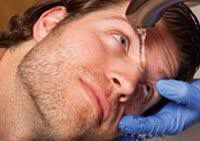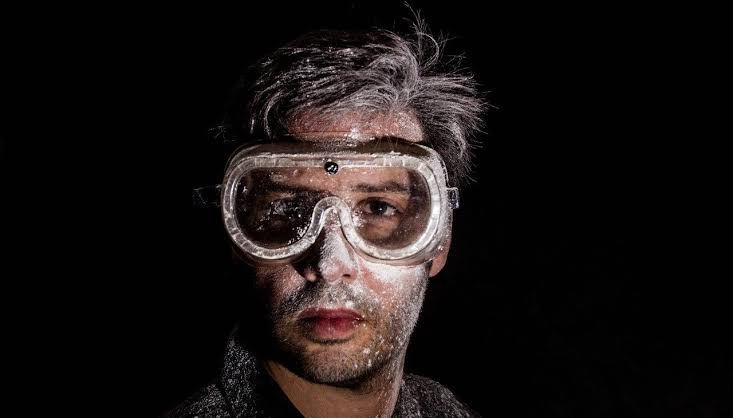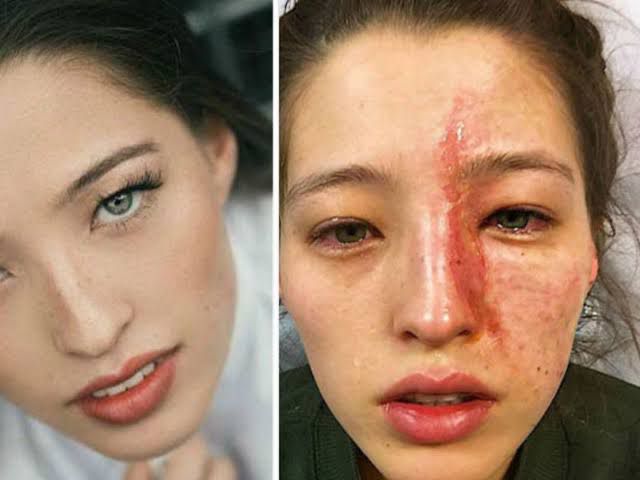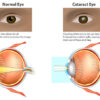CHEMICAL EYE BURNS/ADHESIVES IN THE EYE
CHEMICAL EYE BURNS/ADHESIVES IN THE EYE
An eye burn (ocular burn) can be caused by heat or, more commonly, by getting a chemical in the eye. A chemical burn in the eye occurs when a chemical in liquid, powder or vapor form injures the eye or eyelid. It is important to get immediate treatment for a chemical burn to prevent vision loss especially in alkali (such as oven or drain cleaner) burns which tends to cause more serious eye damage more quickly than acid (such as battery acid or hydrochloric acid) burns.
Adhesive compounds, like nail glue, superglue and eyelash glue can pose a threat to your eyes — whether that threat is a simple irritation or something more severe.
Vapors and harsh scents given off by these products can cause tearing of the eyes and make the eyes feel irritated, while getting glue in the eye itself can be dangerous for your vision.
Although many glue-in-eye scenarios only temporarily impact vision, some situations will require that you seek medical attention to ensure you receive the proper care.
RISKS ASSOCIATED WITH GLUE IN EYES
Why is it important to seek medical help if you get glue in your eyes? There are several negative outcomes that can occur after getting glue in your eyes, including the following:
- Eye irritation
- Inflammation of the conjunctiva
- Corneal abrasion
- Eyelashes or eyelids sticking together
- Infection following an allergic reaction, bacterial or chemical exposure
HOW DO I REMOVE GLUE FROM MY EYE?
Getting adhesive products in your eye can be a frightening and frustrating experience, but it is important to remain as calm as possible and refrain from taking extreme measures to remove the glue.
Eyes should be irrigated/rinsed immediately after coming into contact with chemicals/adhesives, regardless of how mild or strong the formula.
There are several methods for properly irrigating the eyes, each of which should be done for at least five minutes (the stronger the glue, the longer you will need to rinse the eyes up to 15 minutes) and with lukewarm water.
- Only rinse your eyes with lukewarm water; do not use soap, acetone or other solvents to try to encourage the product to dissolve and wash away. This can cause further irritation and make the situation worse.
- Rinse eyes for at least 15 minutes after contact with super glue.
- Do not try to force the eye or skin apart if it sticks together, as this can cause injury or tearing. You may gently rotate your fingers in a circular motion if needed.

Some super glue containers are similar to those of eye ointments, so it’s very important to read labels carefully before putting anything in your eyes.
EYELASH GLUE IN YOUR EYE
Many eyelash adhesives contain an ingredient also found in superglue (cyanoacrylate). This chemical can be harmful to your natural eyelashes if the adhesive is applied wrong, and lashes can sometimes be pulled out by the glue unintentionally.
Fear not if you experience sensitivity to eyelash glue, as there are varieties in the market formulated for sensitive eyes. Aside from sensitivities, eyelash glue can hurt your eyes if it gets into them. Rinse your eyes immediately with lukewarm water for at least five minutes if the glue comes into contact with your eye.
If irritation does not subside after a thorough rinse, contact your eye doctor for further evaluation and treatment. It’s also best to avoid makeup and false lashes if you injure your eye by getting glue in it until your eye is completely healed.
RECOMMENDED PRACTICES FOR EYE SAFETY
Taking safety precautions before using or working with adhesives can prevent emergencies related to the eyes.
EYE SAFETY TIPS WHILE WORKING WITH GLUE AND CHEMICALS
- Wear proper eye protection while working with crafts or other projects that require the use of strong adhesives.

- Wash your hands thoroughly after handling products that can irritate the eyes, including glue.
- Don’t touch your eyes while using any kind of glue (other than eyelash adhesive), especially superglue.
- Supervise children during activities that involve products that can harm their eyes. Teach children about eye safety before they take part in such activities.
- Store crafting and project glue in an area separate from medical products to prevent any mix-ups during use.
EYE MAKEUP AND LASH ADHESIVE SAFETY TIPS
- Wash your hands before and after applying eye makeup especially following glue used for cosmetics.
- Safely remove all eye makeup, including false eyelash glue completely after use and before going to sleep.
- Clean fake eyelashes before reapplying them in future use.
- Store cosmetics you use around your eyes in a cool and dry place to preserve their quality.
- Keep your eyes closed whenever you apply makeup and false lashes.
- Only use makeup and other cosmetic products that are safe for use around the eyes.
- Always read the ingredients on your eyelash adhesive before application. If you are sensitive or allergic to an ingredient, avoid the product.
- If you have eyelash extensions, have them removed or replaced regularly to prevent buildup and other complications.
- Eyelash extensions should be applied by a certified technician, and safety guidelines should be followed before, during and after they are applied.
- Avoid wearing makeup if you are recovering from an eye injury, including getting glue in your eye(s).
TREATMENT
Getting chemicals or glue in your eyes is an unfavorable experience, no matter what type of chemical/glue is involved. Fortunately, there are treatments to help you make a full recovery. These can include:
- Rinsing/irrigating eyes to encourage glue/chemical removal
- Trimming the eyelashes to separate lids or remove glue residue
- Professional removal of the glue by an eye doctor
- Topical antibiotics
- Artificial tears to soothe irritated eyes
- Covering the eye with a gauze patch while it heals
Additional treatment may be needed for extreme cases or cases that involve corneal abrasion, infection or other conditions.
In addition to all outlined safety tips, it’s important to see an eye doctor once a year for a routine eye exam. Doing so allows your doctor to monitor the health of your eyes and vision and keep you seeing clearly.



